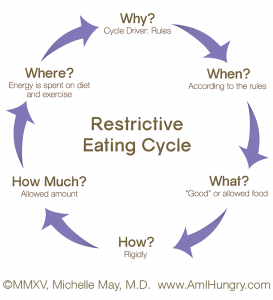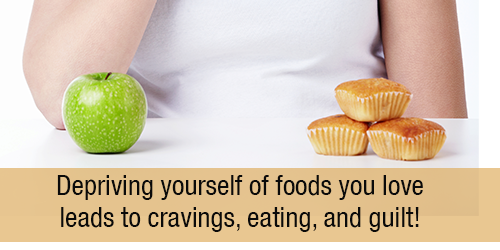Deprivation is a surprising, hidden trigger for eating. When you’re “not allowed” to eat foods you love, foods others eat, or the amount of food you’re hungry for, you may develop feelings of deprivation. Restriction and deprivation often lead to powerful cravings and overeating.
People who eat instinctively don’t usually deprive themselves
In this video and post, I shared that I struggled with the “eat-repent-repeat” cycle for many years before noticing that people who eat instinctively ate for very different reasons.
I realized that why I was eating drove every other decision that followed: When I ate, what I are, how I ate, how much I ate, and where I spent my energy. With this huge aha, I finally began to change the reasons I ate. In the last video, I shared a really cool script that will help you decode emotional eating to figure out what to do instead.
Now let’s talk about a (maybe not so secret anymore!) hidden trigger for eating: Deprivation.
Deprivation leads to more eating!
It became clear why diets hadn’t worked for me (or most other people) long term: they were treating the wrong problem—and worse, because they often lead to deprivation, they become part of the problem!
Deprivation contributes to a pattern I call the Restrictive Eating Cycle.
 All those years I blamed myself for not being able to stick to a restrictive diet, when in fact, the diet itself was increasing my focus on food. This increased my feelings of deprivation, cravings, overeating, and guilt – which just led to more overeating. That was no way to live. And now I don’t have to.
All those years I blamed myself for not being able to stick to a restrictive diet, when in fact, the diet itself was increasing my focus on food. This increased my feelings of deprivation, cravings, overeating, and guilt – which just led to more overeating. That was no way to live. And now I don’t have to.
And neither do you!
Replace deprivation with mindful decision-making
I’ve had the privilege of spending more than twenty years teaching thousands of people a completely different way to manage their eating so they can free up their energy to live the vibrant life they crave.
Ending your Restrictive Eating Cycle can be scary. You may have fears like, “I’ll lose control,” “I won’t eat healthy foods,” and “I can’t trust myself.” But rest assured, being able to eat anything doesn’t mean you’ll eat everything!
By replacing deprivation-based rules with mindful decision-making, you learn to be in charge of your eating instead of vacillating between feeling in control then out of control.
I included a mindful eating visualization in the video to help you imagine yourself living this way. Think about what you would do or do differently in your life if you were free of your eat-repent repeat cycle.
Ready to build a joyful, confident, peaceful relationship with food? Join us for the Eat Mindfully, Live Vibrantly Program! Click here to learn more!

This article has been updated from a previous version.


12 thoughts on “Deprivation: A Hidden Trigger for Eating”
Michelle, you asked for comments, from people who have been eating mindfully for awhile, and I thought I would share about today, a normal Sunday for me — a day when my family decides where they want to eat and I usually don’t choose but “go along for the ride”. For someone like me who likes to have at least a partial plan for what I am going to be eating a day in advance, Sundays can be challenging. At any rate, we had a homemade pepperoni / mushroom /onion / olive / roasted garlic pizza last night. I ate a piece and a half last night, and set aside the other half piece to heat up for breakfast. While heating that up this morning, I ate a slice of summer sausage, havarti cheese and a table cracker that was leftover from my requested Christmas Hickory Farms goodie box, and felt pretty satiated after eating that and eating the half slice of pizza. The family chose Cracker Barrel for lunch – not my most favorite or least favorite place. Meh. I ordered a rib-eye with mashed potatoes and a salad with blue cheese (I do love their croutons). I ate about half the salad, let my kids pick some croutons off of it, and set it aside. The steak came and it was a bit overcooked, but my mom likes well done steak so I gave half of it to her. I put some butter on the mashed potatoes and had a few bites, and ate a half a biscuit with butter (Oh yeah really like butter too :). Since Sunday is the only evening we don’t cook at home I had no idea what I was going to have for dinner, and honestly didn’t think about it until I saw the email with the video link on my phone when I stopped at a convenience store on the way home from the family visit. I realized I was feeling like I needed some fuel, and it was way too cold to stop and get a frozen yogurt tonight (something I often do for dinner on Sundays) — fortunately, I saw a small can of smoked herring and thought, “that would be good with some cream cheese on a leftover bagel!’ so I grabbed that, got home, toasted half of a bagel, spread some cream cheese on it along with the herring, and ate it. After eating, I watched the video, and decided to post this. But first — some chocolate! I eyed a bag of individually wrapped peppermint bark pieces and ate one piece. Since it was just for the taste the one piece was perfect — I wasn’t really hungry any more but that sure sounded good! At any rate, here I am, posting and feeling content and remembering how eating in this way was a completely foreign concept to me six years ago — today I had mostly food I loved, put aside or ate a reduced amount of the stuff that was “meh” or that I simply just needed for fuel, and spent the whole day feeling energized. That’s a real day for me on this “program”. I hope this helps …
Thanks Dave! As I read this, I heard a man who is making mindful decisions–which is very different from the mindless or restrictive approach that plagues our culture these days and leads to obsession, weight cycling, and sadness!
(If anyone would like to read it, Dave shared his Personal Story: https://amihungry.com/personal_stories/how-mindful-eating-changed-my-life/)
Hi Michelle. Once again, this video spoke to my heart and opened up new insights into the program and what it’s done for me over the past two years. I started with the Am I Hungry? Mindful Eating Program in January 2014. When your book Eat What You Love, Love What You Eat for Binge Eating came out, I rejoiced and immediately signed up for the October 2014 retreat…what a powerful, life-changing event that was! I felt so unburdened by the end. However, I knew I still needed more serious time to master the simple techniques and to heal my relationship with food. Thankfully, our local clinic offered the Am I Hungry? Mindful Eating for Binge Eating program in my town and I was able to spend more dedicated time to working through my challenges. I have found since then that I need the connection to others who are on this journey because they get it. The continuing care groups and the tele-coaching sessions help keep me focused when my life spins out of control, as it often does due to my work.
What would I do differently with my extra energy? I’ll admit that I’ve been struggling with mindless eating for a few weeks (I’m mindful that I’m mindless) . I know why, and I can surely tell that I have no extra energy, so this is a perfect question for me to answer. I would dance! One comment that you made in the video hit me right between the eyes: “Do what you love; love what you do!” I love to dance and have been waiting until I retire to do so (all or nothing thinking, right?). The answer was right in front of my face: close my office door and dance when I want to eat at work and I’m not hungry…the one small step that I can take to meet the need that I have instead of eating.
One last word about fearing that the “addiction” to food cannot be overcome. As you did, I too discovered that once I had taken back the power, the food lost its power over me. I can eat one or two bites and leave perfectly good food (love that description) on the plate. Take heart; it is possible!
What an amazing journey you are on Paulette! From where you were when I first met you, to where you are now is nothing short of inspiring! You have stayed focused on healing your relationship with food and doing whatever it takes.
Your comment, “I love to dance and have been waiting until I retire to do so…” is so important for people to hear. What are we putting off – and why? THIS is our life, now! So dance!
P.S. In terms of no longer feeling addicted to food, do you think that feeling came from what the food was doing before you learned all of these other skills that do it better?
Dr. May,
First let me say I am absolutely loving mindful eating. I’ve introduced it into my life as an athlete, and though I am not perfect at it, I have seen such huge attitude change through the 3 weeks I’ve been trying it! I had previously struggled from some mindless eating, episodes of binge eating and restrictive eating, and a worried attitude towards food, almost fearful at times. This program has corrected my attitudes a lot, and helped me to see food as a tool and a blessing in my life, not something to idolize OR fear!
Second, I’d like to ask for your insight about the one issue it has failed me on. Sometimes, I wake up at night and have the urge to binge, and just find myself eating. I feel like I miss the chance to choose because I’m not fully awake or alert. It’s almost like sleep eating. If I’m hungry when going to sleep, I’ll have a snack before bed to assure I can make it through the night, but sometimes I’ll still find myself finishing up my box of breakfast cereal at 2 am! I feel that it is related to anxiety and stress, not hunger, because sometimes when it happens I realize that I had been awakened by loud neighbors or had a really rough day the day before. However, I just want to figure out how to create a time of awareness before I start eating so that I can ask myself, what do I really need right now? Usually, it would be a drink of water or to hop back in bed or to read a few pages of a good book. Maybe even some deep breathing exercises or a yoga session. What do you suggest? Have you encountered this problem before?
I am so glad that mindful eating is helping you! As for your other symptoms, I agree that awareness would be helpful but please seek additional consultation with your primary care physician and an eating disorder specialist to be evaluated and treated for possible Night Eating Syndrome.
Comments are closed.